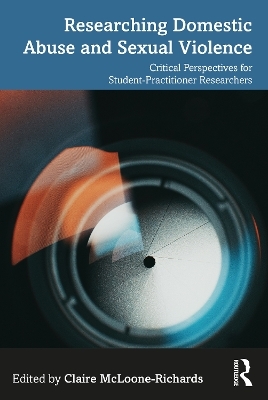
Researching Domestic Abuse and Sexual Violence
Routledge (Verlag)
978-1-032-18907-9 (ISBN)
This book offers a critical examination of the ethical and moral challenges in conducting research about domestic abuse or sexual violence from the perspectives of studentpractitioners and novice researchers within various professional disciplines, offering rich insights based on the experiences of each author.
Including the research expertise of academics in this field and importantly, the experiences of student-practitioners in conducting their research, the book explores practice-informed research and research-informed practice, in relation to the examination of a range of issues and themes related to DA and SV. All contributors consider the challenges and reflect on the salient issues related to their ethical research, and with some of the research conducted during the global pandemic of COVID-19, they also reflect on these additional challenges and how they sought to address them. The reader is invited to consider the different national and international, gendered, cultural, and social contexts of DA and SV from early childhood to old age. With a constant thread of critical reflection, they are encouraged to think about their own positionality to the unfolding discussions within each chapter, and how these may relate to their professional practice, their research, and their professional values. Overall, the book sets out to (1) articulate the dominant theoretical frameworks that have sought to offer explanations about domestic abuse and sexual violence within the research problems presented by the student-practitioners, (2) evaluate the significance of the legislation and policy provision within the UK in service provision and interventions for victims and perpetrators, (3) showcase best practice examples of research studies on domestic abuse and sexual violence based on the experiences of studentpractitioners, (4) promote a critical appraisal of the self and the positionality of the practitioner as researcher, through reflection on their personal and professional development, and (5) reflect on the impact of the shadow pandemic on the experiences of vulnerable individuals and the challenges of conducting research ethically and safely.
This is essential reading for students either currently engaged in or with aspirations to work in professional practice in the DA and SV sectors. It is also useful for students on related graduate MA professional courses, practitioners in social work, health care, criminal justice, counselling, and particularly in the multi-faceted ‘women’s sector’. It will also appeal to final-year students undertaking primary research in social work, health care, women’s studies, and criminology.
Claire McLoone-Richards is a feminist scholar and social scientist within the Department for Violence Prevention, Trauma and Criminology at the University of Worcester, UK. Her teaching and research relate to the study and prevention of violence, and its impact on victims and survivors. Claire is particularly interested in the concept of professional advocacy for children and women as victims of abuse and neglect within the family, the community, and other institutional contexts. As a barrister (non-practising) she remains a committed advocate for the rights of children and young people. Claire has researched and written extensively about aspects of the voice of the child in the context of child protection and violence against women within professional practice and integrated working. She has considerable experience in multi-agency partnerships working in the fields of mental health, substance use, and domestic and sexual violence. Claire has been an active member of the former Local Safeguarding Children Board, the Co-ordinator of the Worcestershire Forum Against Domestic and Sexual Violence, and is the Past Chair of the Association for Child Protection Professionals (AoCPP) formerly known as BASPCAN.
Introduction: Positioning the student perspective on doing research.
Claire McLoone-Richards
Researching Domestic Abuse and Sexual Violence: Ethical and Methodological Considerations. Holly Taylor-Dunn
Intersectional research narratives and reflections. Neelam Rose
Is it just a normal feature of their romantic relationships? Levels of acceptance towards adolescent digital dating abuse. Emma Jane Noble
The dynamics and perspectives of stalking and harassment behaviours. Malin Lunde Jensen
Why didn’t she fight back? An exploration of victim blaming through tonic immobility reactions to sexual violence. Sophie Heritage
Understanding the perspectives of professionals working with female victims of male perpetrated sexual violence and the concern of secondary victimisation. Jade Jeffrey
Social Workers’ response to women "Fleeing and Leaving" domestic abuse within the context of child protection. Ayla Nasuh
The relationship between trauma recovery and statutory responses to safeguarding families affected by domestic abuse. Katharine Jones
A qualitative study exploring the experience of sleep deprivation as a means of coercive control in intimate relationships. Suzie Richards
The British Army and Domestic Abuse. Dave Aitken
Crime between the Lines: Policing Coercive Control. Sarah Pugh
Concluding Remarks: An editorial call to the novice researcher. Claire McLoone-Richards
| Erscheinungsdatum | 30.08.2023 |
|---|---|
| Zusatzinfo | 1 Tables, black and white |
| Verlagsort | London |
| Sprache | englisch |
| Maße | 174 x 246 mm |
| Gewicht | 260 g |
| Themenwelt | Geisteswissenschaften ► Psychologie ► Allgemeine Psychologie |
| Geisteswissenschaften ► Psychologie ► Entwicklungspsychologie | |
| Recht / Steuern ► Strafrecht ► Kriminologie | |
| Sozialwissenschaften ► Soziologie | |
| ISBN-10 | 1-032-18907-X / 103218907X |
| ISBN-13 | 978-1-032-18907-9 / 9781032189079 |
| Zustand | Neuware |
| Haben Sie eine Frage zum Produkt? |
aus dem Bereich


